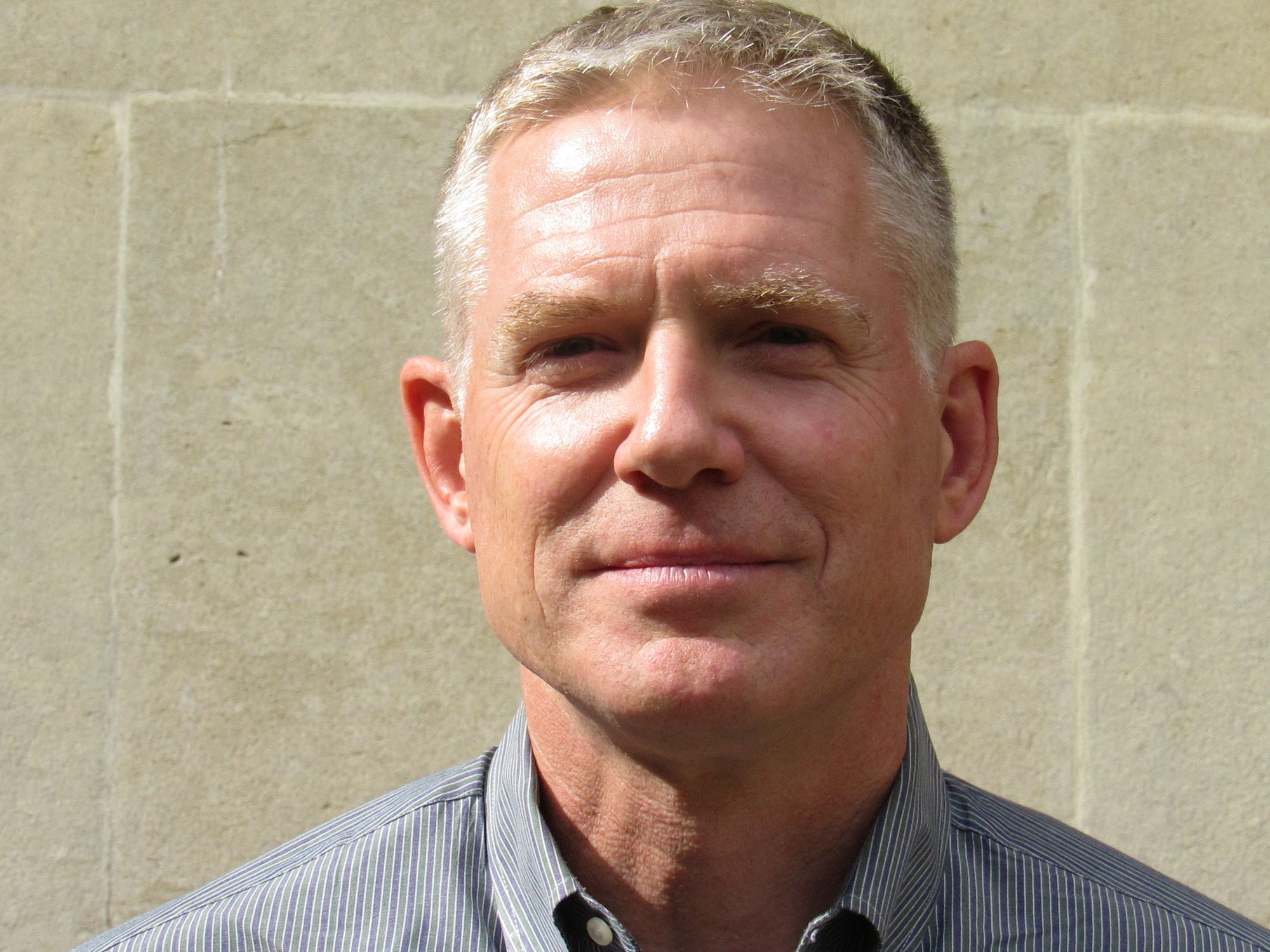From the Field to the Publishing Room: A Life in Literature — Alumni Profile, Niko Pfund ’87
From Iain Banks to Toni Morrison, Niko Pfund ’87’s lifelong interactions with literature have inspired his passion for communicating ideas through publishing.


Niko Pfund ’87 embodies two of the central values of a liberal arts education: the curiosity needed to discover a wide array of topics, and the critical thinking necessary to make sense of them.
These traits shine through in an anecdote Pfund told me about a talk he heard while working at New York University Press. “When you go to college you want to be in the mix of it,” Pfund recalled the lecturer, a professor at NYU, saying. “You don’t want to be sitting in some field reading for four years.” Pfund disagreed. “I remember thinking I loved sitting in a field for four years,” he said. “That was how I figured out who I was and who I wanted to be … I’m not down with the idea that a contemplative life is somehow dilettantish.”
Instead, Pfund values never getting too caught up in “the mix of it” to see the bigger picture. He is always finding ways to see things from different perspectives, to learn and think about new issues with an open and inquisitive mind. Pfund also values community, and he said that looking for ways to be independent without being isolated has been a central struggle of his life. He’s found these in a number of places: among his peers, his family, his workplace — even at his local dog park.
Pfund has brought all of these skills and values into his professional life. As the President of Oxford University Press USA, Pfund relishes the opportunity to forge community while interacting with a huge variety of ideas and arguments and finding the most effective ways to make these ideas publicly accessible.
A Breath of Fresh Air
When Pfund started applying to colleges, Amherst was a natural choice. Both his father and older sister had attended Amherst. He applied through early admission, got in, and “that was that.” Despite his legacy status, Pfund was overjoyed to read about Amherst’s recent decision to end legacy admissions, which he calls “a largely indefensible system of feathering the nests of those who need it the least.”
For Pfund, coming to Amherst was a breath of fresh air. Entering the American high school system from Germany at thirteen years old, he remembers being frustrated by the almost comical “Breakfast Club” style stratifications among “athletes, jocks, stoners, and social outcasts” at his high school. The situation was perhaps particularly frustrating because Pfund’s characteristic variety of interests meant he felt like he “had a foot in each of those groups.”
At Amherst, he was relieved to find that instead of grouping themselves into those “comedy boxes,” almost every Amherst student he met was following “all sorts of eclectic interests and pursuits.” Even better was the collaborative atmosphere he experienced — “it never occurred to me to compete against my friends at Amherst,” he reflected. “It felt like us against the world, not us against us.”
Less refreshing than the social atmosphere were his struggles with the chemistry classes he took as part of his plan to be a marine biologist. He laughs that “I’d be stuck in the lab until 6:45, worrying that there wouldn’t be any chicken left in Valentine, because I couldn’t figure out how to make the liquid green, or whatever color it was supposed to be.” He managed to get through that class, and ended up with a B- which he still calls one of “the two grades I was proudest to have achieved at Amherst” (the other being a C+ he earned in Econ).
“Sitting in a Field Reading”
While taking chemistry, Pfund began comparing himself to one of his friends in the class, a basketball teammate named Paul. Pfund noticed that, although Paul would breeze through the labs he was stuck on, Pfund had a much easier time with essays that Paul had to labor through. Realizing that he had a talent for essay writing, Pfund began shifting his academic interests.
He spent some time reading voraciously while dabbling in political science, English, and law, jurisprudence, and social thought before a pair of events got him to commit to an English major. The first was the hiring of Professor of Black Studies and English Rhonda Cobham-Sander, who Pfund describes as indispensable in broadening the English department’s scope from “a very particular New England centric kind of literature” towards world literature. At the same time, Pfund had fallen in love with “Tar Baby,” Toni Morrison’s then newly-released third book. “At that point it all came together,” he said. “I read that book and then took a great literature course with [Cobham-Sander] … and I realized that I wanted to write a thesis on Toni Morrison.”
When I asked which book had influenced him the most, Pfund hesitated to give a single answer, preferring to acknowledge the wide variety of sources that influenced him. “Tar Baby” was, of course, important, and Pfund said that it gave him a permanent fascination with literature which plays with the boundaries of perspective.
One recent work he recommended in this style is “Girl, Woman, Other” by Bernardin Evaristo, a integrated set of stories set in London in which “there’ll be a very peripheral character in one of the stories, who’s depicted as a nuisance, or a pain in the ass, and then in the next story, all of a sudden you’re reading from that previously peripheral perspective.”
Pfund also emphasized the importance of several other works to him. Some of his first interactions with literature came through genre fiction, which he said he still gravitates towards in his personal reading. One of his favorite writers in this field is Scottish sci-fi author Iain Banks, and Pfund singles out the opening of his “Culture” novels as “five of the most imaginative pages [he’s] ever read.”
Cold War-era Polish journalist Ryszard Kapuściński also merited a mention. Pfund said that reading Kapuściński’s works in college contributed to setting him on the path towards journalism, and, after graduation, the publishing world.
In all, Pfund’s “four years of sitting in a field reading” at Amherst provided him with a strong set of intellectual tools, and broadened his diverse set of interests.
His discovery of perspective-bending literature led Pfund towards what he calls one of the central lessons of his life — the importance of looking outside yourself and “trying to figure out what the communal purpose, and the best thing for the community is.”
Into the Publishing Room
After Amherst, Pfund was initially drawn towards journalism, a career that would keep him involved with literature. Inspired by Kapuściński, he first explored journalism as an option, applying for an internship with R.W. Apple Jr., a well known columnist with the New York Times.
He was selected as a finalist for the job, but learned later on the same day that the Times had canceled the internship, “a real disappointment of the first order.”
Pfund went back into the career counseling office, leafing through three-ring binders to find interesting job openings, something that “would take you 30 seconds now on LinkedIn” he jokes. After sending out a flurry of letters, Pfund got a response from Valerie Aubrey — an Amherst alum working as editor of politics, sociology, and law at Oxford University Press. The two met and, by the end of the summer Pfund was working as an assistant editor at Oxford.
Looking back, Pfund sees this as one of the most difficult periods of his life. “I was working probably 50, 60 hours a week,” he said, adding that “[after rent] I was trying to live on $380 a month in New York. I’ve never been more focused on money in my life than [then], because I had no money.”
During this time, Pfund found it nearly impossible to find an enjoyable balance between work, relationships, and personal time. Fortunately, after three years, Pfund received a promotion to an editorial role at New York University Press, where he spent the next decade before returning to Oxford in 2000.
Pfund talks about publishing with enthusiasm and a wealth of knowledge. Considering his curiosity and long-standing interest in critical thinking, it is probably unsurprising that for Pfund “the fundamental work we do [as publishers], which is assessing a wide variety of people’s ideas and arguments … and then looking at whether we can spread that message and sustain ourselves at the same time … is a dynamic I love. And it’s something I probably love more now than ever before,” he added.
Turning to the Next Page
Looking ahead, Pfund sees both a variety of opportunities and challenges for the publishing industry. New technologies are often seen as the bogeyman of publishing, but Pfund disagrees. “Twenty years ago, people were talking about the death of the publishing industry” — Pfund observed, but he counters that digitization has in many ways actually been a boon for publishers’ ability to do their primary job of connecting people with ideas. “Think about scholarly research … [or] exegetic works of learning that people dip into to look around and pull out relevant parts,” he said. “For that, digital is a revelation.”
He suspects that it will be more difficult to manage the transition from an in-person to a hybrid workplace. “I think the defining challenge of the twilight of my professional life will be trying to replicate a traditionally strong and adhesive culture at Oxford when people are communicating like this,” he said, pointing to his computer screen.
For now though, Pfund is happily doing the things he’s always valued. His isolation during much of the pandemic has encouraged him to double down on finding a wide set of communities — “I’ve become a member of my dog park community, to my own surprise,” he commented disbelievingly.
At the same time, Pfund is still reading as much as ever. He said one of his greatest joys right now is finding time to sit down to read The Atlantic from cover to cover. In many ways, his career in publishing, the field where people and ideas meet, looks like the natural outcome of his lifelong interest in both literature and community.






Comments ()